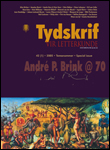André Brink: An aesthetics of response
DOI:
https://doi.org/10.4314/tvl.v42i1.29688Keywords:
A. P. Brink, aesthetics of response, anti-apartheid, writer's responsibilityAbstract
As a commentator on the enormities of the apartheid state, André Brink rose to international prominence during the struggle against apartheid in the 1970s and 1980s. In interviews, speeches and non-fictional writing, Brink's enduring meditation on the writer's responsibility to a society in a state of moral and political siege is exemplary in its revelation and passionate interrogation of the subtle discursive strategies of apartheid. Beginning with Looking on Darkness, Brink's fiction apparently shares similar concerns. However, recurrently engaging with colonial and racial myths, Brink's fiction invariably tends towards their revalidation; polemically opposed to the Afrikaner hegemony, his fiction nonetheless paradoxically often reads like a veiled reification of the apartheid power structure. Locating Brink's anti-apartheid reputation firmly in his non-fictional discourse, this essay also explores the dynamism of Brink's critical sensibilities in a movement that stretches from social realism (in the apartheid dispensation) to postmodernism in post-apartheid South Africa. It also attempts to account for Brink's novelistic and political dilemmas by highlighting the implications of his constant evocation of an apocalyptic vision typically deriving from his Afrikaner heritage and even more crucially of his abiding recourse to Eurocentric humanist universals. The essay finally engages with the paradox that the aesthetic approach which vitiated the urgency of Brink's liberation politics in apartheid South Africa may well be the main spring of his significance in post-apartheid South Africa and the international community.
Downloads
References
...
Downloads
Published
Issue
Section
License
Copyright (c) 2005 Tydskrif vir Letterkunde

This work is licensed under a Creative Commons Attribution-ShareAlike 4.0 International License.


 https://orcid.org/0000-0001-6465-6584
https://orcid.org/0000-0001-6465-6584


.png)